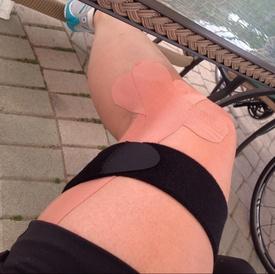Can someone explain'water weight'?

3foldchord
Posts: 2,918 Member
If someone remarks they 'went on vacation last week and gained 5 pounds" people say it's just water weight and it will come right off. I understand slightly, but can can one of you super scientific fitness people offer further explanation.
A friend remarked they gained 20 pounds over the holidays. How does one know if it is water weight or 'real weight'.... How long does it take to gain 'real weight' versus 'water weight'?
A friend remarked they gained 20 pounds over the holidays. How does one know if it is water weight or 'real weight'.... How long does it take to gain 'real weight' versus 'water weight'?
0
Replies
-
I just googled it.... It seems that glycogen is 4 water molecules, so when you gain a glycogen you also gain the water molecules, and losing the glycogen loses those attached water molecules.... If Google was telling me the truth. ( there was more to the explanation, but this was the part my brain needed)0
-
No expert here but this article I found as useful- http://www.livestrong.com/article/546068-what-does-eating-too-much-sodium-do-if-you-are-trying-to-lose-weight/.
Hope that helped!0 -
Most fun foods and unhealthy foods are high in sodium, excessive sodium causes a fluid shift in your body and tells the body to retain and hold onto fluid (water). When people are eating healthy they likely have a diet that is low in sodium by default verses a fast food diet that will overload your body with excessive sodium. When you eat healthy for an extended period of time and you are drinking water and eating lots of protein, veggies and fruit, then you are not ingesting a lot of sodium. When you go off eating that healthy diet and have a cheat day or week then you likely are eating "bad" foods that are higher in sodium and fat and this you retain a good amount of water due to sodium. Once you go back to eating more healthy natural foods you don't retain the 'water weight' and you loss the few lbs of bloat.0
-
What the above poster said. It's the sodium packed in foods from eating out and not making it yourself. It will take a few days of eating what you normally do and those extra pounds come right back off (or at least they have for me). Generally it also takes another new pound with it!
 0
0 -
I just googled it.... It seems that glycogen is 4 water molecules, so when you gain a glycogen you also gain the water molecules, and losing the glycogen loses those attached water molecules.... If Google was telling me the truth. ( there was more to the explanation, but this was the part my brain needed)
That and electrolyte imbalances especially sodium. You only gain glycogen and water if you body thinks your muscles are depleted or you increase exercise and the body chooses to store more fuel, but not 20 pounds worth.
How do you know if some or all is water weight? By measuring your body fat and by using common sense as to how much you have overeaten or how much salt you have consumed. It's virtually impossible to gain 20 pounds of fat in a few days, that would be somewhere in the region of 70,000 extra calories consumed.0 -
I make my own stuff as often as I can and don't do extra salt, we even grocery shop on vacation. Though we out out some..... But it could be why I only seemed to gain 2 pounds on vacation instead of 10 or 20.
So there appear to be two causes of water weight, the whole,glycogen replacement when people take a break from 'dieting' and the sodium....0 -
That and electrolyte imbalances especially sodium. You only gain glycogen and water if you body thinks your muscles are depleted or you increase exercise and the body chooses to store more fuel, but not 20 pounds worth.
. It's virtually impossible to gain 20 pounds of fat in a few days, that would be somewhere in the region of 70,000 extra calories consumed.
My acquaintance may have meant 'since Thanksgiving through New Years" when he said he gained 20pounds over the holidays. I dunno.
I do try to eat lower carbs so maybe on vacation by body is storing all those extra vacation carbs as glycogen with water molecules.....
Either way, it is good to know how things work.0 -
I just googled it.... It seems that glycogen is 4 water molecules, so when you gain a glycogen you also gain the water molecules, and losing the glycogen loses those attached water molecules.... If Google was telling me the truth. ( there was more to the explanation, but this was the part my brain needed)
Google is your friend!! Yes, that's the basics of it. The amount of water in your body can fluctuate daily. Your body will "retain water" for a variety of reasons, not just sodium.0 -
Water is used to balance the amount of electrolytes (sodium, potassium, magnesium, etc.) inside of and outside your cells. A fluctuation in sodium intake (not necessarily a "high" intake per se) may cause you to retain water to bring your electrolytes back into balance.
You know it's water weight if it only hangs around for a week or two after you resume your typical diet. If it lasts longer than that, it's probably "real" weight.
Water weight can fluctuate quite rapidly, 10 lbs in a day is not uncommon depending on the size of the person and other factors.0 -
you can look at the glycogen water weight as having around 500 calories per pound, vs fat being about 3500 calories per pound. This is why almost everyone will see a quick drop of at least a few pounds the first week or 3 they've been eating better and exercising, and then it slows down.
You can drop this 'water weight' quicker by switching to a low-carb diet for a short period of time if you really want to, but it's hard to give up bread, cereal, pasta, ketchup, bbq sauce, and anything else containing 'grains' or processed sugar
Edited to add that sodium does play a part in actual WATER retention, not just glycogen, and as has been stated, this will also contribute to a fast "weight" gain or loss.0 -
you can look at the glycogen water weight as having around 500 calories per pound, vs fat being about 3500 calories per pound. . . .
Thanks. That is helpful.0 -
Water is used to balance the amount of electrolytes (sodium, potassium, magnesium, etc.) inside of and outside your cells. A fluctuation in sodium intake (not necessarily a "high" intake per se) may cause you to retain water to bring your electrolytes back into balance.
You know it's water weight if it only hangs around for a week or two after you resume your typical diet. If it lasts longer than that, it's probably "real" weight.
Water weight can fluctuate quite rapidly, 10 lbs in a day is not uncommon depending on the size of the person and other factors.
Good explaination. I was wondering the same thing because assumed it was but was not exactly sure how it worked.0 -
It's probably more useful to call it "water retention." It is the abnormal accumulation of excess fluid in the circulatory system or the tissues or cavities of the body. There are many causes. Some are related to inflammatory processes like histamine or the repair of tissue. Some causes are hormonal. It can be caused by the kidneys, cardiovascular system, protein levels. If you quickly gain a large amount of weight when eating out it is from over-consumption of sodium. This is common and temporary. As long as you return to a lower sodium diet this weight should come off within days. You can speed up the process with a diuretic or with foods that have have a diuretic effect but that is generally unnecessary unless you have high blood pressure.
It sounds like your friend gained both water weight and fat. It's very easy to over-consume much more than we think during the holidays. Whatever doesn't come off after the first 2 weeks of changing to a low sodium diet is mostly body-mass.0 -
0
-
Listen to the guy with the tie and this:
Things I can think of that make you gain non-fat weight:
excess salt (we need a certain amount in our bodies)
carbs (which turns to glycogen quickly, and if you exercise allot, the more the merrier)
exercise (while repairing muscles)
My biggest weight gain over night at 5'7 and 120lbs was about 10 lbs after a particularly steep 16km hike. I was still on a calorie deficit so over all I didn't gain any weight by the end of the week, but I ate extra carbs from the calorie burn, and I hiked 16km. I'm glad I did all those things because I was quite pooped out, and I probably would have injured myself if I hadn't have had the extra fuel (lack of fuel=easy injury times).
Maintaining muscle can keep good weight on. By volume, fat weighs more then muscle. If we have the same weight of fat and muscle, the fat will be bigger. Many of us think we have to get rid of 'weight' to be healthy. That is wrong. I'd rather be a skinny girl with muscles then a skinny thicker version thats all squish and slightly lighter. I gave my 30lb more then me friend who's been going to the gym regularly and lifting weights and after losing 50lbs a few of my dresses and she didn't understand how she fit into them. This is why.
Ways to gain fat
1lb fat =3500 calories
When we gain weight we gain a ratio of muscle and fat
You have to eat over 3500 calories over your EE (energy expenditure). For those of you who know, you can estimate your TDEE via your BMR and activity level. Add 3500 calories on top of that and you still haven't likely gained all fat.0 -
Thanks for that pointer. Really enjoyed that article.
The effect of salt is overrated, though, compared to the effect of carbs. For the vast majority of people, easing up on sugar and white flour will make sodium a non-issue.0 -
The effect of salt is overrated, though, compared to the effect of carbs. For the vast majority of people, easing up on sugar and white flour will make sodium a non-issue.
Vast majority? I don't know. It certainly depends on the individual's sensitivity to salt and where they are coming from as far as a diet. If someone is very insensitive to salt with a diet rich in refined sugar & carbohydrate then OK. Is this the "vast majority" of the population? I'm not sure.
If we look at the population most sensitive to water retention (people with all kinds of high blood pressure) the opposite is the case. For these people sodium intake is the main concern and source of advice from their doctors not sugar or carbs. Personally I find that very telling.
Certainly both cause water retention and from an intuitive standpoint I'd assume most people lie somewhere in the middle as far as sodium sensitivity. Given the standard western diet is sodium and refined carb and sugar rich I think it's hard to argue either as a non-issue.0 -
Thanks for all the info.
I knew of sodium and the glycogen, slightly, but had not thought of the muscle repair type stuff. Makes sense though.0 -
Thanks for all the info.
I knew of sodium and the glycogen, slightly, but had not thought of the muscle repair type stuff. Makes sense though.
muscle repair=glycogen rushing to those muscles to repair. Glycogen = type of fuel that travels around helping the body.0 -
Thanks for that pointer. Really enjoyed that article.
The effect of salt is overrated, though, compared to the effect of carbs. For the vast majority of people, easing up on sugar and white flour will make sodium a non-issue.
Tell that to someone I know who thinks she has a salt deficiency. She's large but I wouldn't call her mostly 'fat'...she's more...puffy and looks like she's been submerged underwater for a long time. Definitely the effects of salt. We had her over for soup one day and knew about her salt obsession so we mad our soup nastily salty, and she continued to poor in a film vial of salt in the soup that she just happened to have in her purse...0 -
Thanks for that pointer. Really enjoyed that article.
The effect of salt is overrated, though, compared to the effect of carbs. For the vast majority of people, easing up on sugar and white flour will make sodium a non-issue.
Tell that to someone I know who thinks she has a salt deficiency. She's large but I wouldn't call her mostly 'fat'...she's more...puffy and looks like she's been submerged underwater for a long time. Definitely the effects of salt. We had her over for soup one day and knew about her salt obsession so we mad our soup nastily salty, and she continued to poor in a film vial of salt in the soup that she just happened to have in her purse...
Euw, that makes me feel I'll, I hardly add salt to anything.
The thing that confuses me about the sodium thing is when people blame lack of weight loss on a high sodium diet. I can understand a sudden increase in sodium having a temporary water gain, but why would a consistently high sodium cause a pause in weight loss. The fat should still go, so are people try to say that people just retain more and more water. Surely if that were the case they would look like the ghostbusters marshmallow man as they continued to retain more an more water.
It seems to me that an increase in sodium can cause an increase in water weight, but a steady consumption should not, so I get puzzled when people look at other peoples diaries and say you are eating too much sodium, and that's why you aren't losing.0 -
Thanks for that pointer. Really enjoyed that article.
The effect of salt is overrated, though, compared to the effect of carbs. For the vast majority of people, easing up on sugar and white flour will make sodium a non-issue.
Tell that to someone I know who thinks she has a salt deficiency. She's large but I wouldn't call her mostly 'fat'...she's more...puffy and looks like she's been submerged underwater for a long time. Definitely the effects of salt. We had her over for soup one day and knew about her salt obsession so we mad our soup nastily salty, and she continued to poor in a film vial of salt in the soup that she just happened to have in her purse...
Euw, that makes me feel I'll, I hardly add salt to anything.
The thing that confuses me about the sodium thing is when people blame lack of weight loss on a high sodium diet. I can understand a sudden increase in sodium having a temporary water gain, but why would a consistently high sodium cause a pause in weight loss. The fat should still go, so are people try to say that people just retain more and more water. Surely if that were the case they would look like the ghostbusters marshmallow man as they continued to retain more an more water.
It seems to me that an increase in sodium can cause an increase in water weight, but a steady consumption should not, so I get puzzled when people look at other peoples diaries and say you are eating too much sodium, and that's why you aren't losing.
I kid you not, I have referenced her looking like the marshmallow man...Not being mean to her but talking about her health to my mom and how we should do something about it and how it can't be good for her heart...she has definitely retained more and more water...and she's spent the weekend...it's not like she eats a whole lot when she's here but I can't say for sure what it's like at home...She use to babysit me when she was young, and she was as slim as I was. The only thing I've seen that has changed food intake wise is the salt.0 -
I'm a little sensitive to salt and can easily gain 5lbs from just one or two high sodium restaurant meals. Conversely it can take me up to two weeks from me to have a similar gain from daily eating of lots of high carb/sugar foods. In my case and many people I know the difference is in orders of magnitude. More importantly you're going to employ the same methods for depleting the glycogen stores as you will to shed fat. That's why the standard of care for Drs is to get on a patients case about sodium and then generally about loosing weight (instead of switching to a low carb diet) when there are problems.
Admittedly the picture looks different for people who are just starting a restricted or healthy diet coming from one that is terrible. For them depleting the glycogen stores is a big source of the initial big loss of water weight. But I don't have any illusions about the weight I gained over the holidays.0 -
The effect of salt is overrated, though, compared to the effect of carbs. For the vast majority of people, easing up on sugar and white flour will make sodium a non-issue.
So white bread can be fuel for glycogen synthesis, but whole wheat bread can't?
You learn something new on MFP every day.0 -
Thanks for that pointer. Really enjoyed that article.
The effect of salt is overrated, though, compared to the effect of carbs. For the vast majority of people, easing up on sugar and white flour will make sodium a non-issue.
Tell that to someone I know who thinks she has a salt deficiency. She's large but I wouldn't call her mostly 'fat'...she's more...puffy and looks like she's been submerged underwater for a long time. Definitely the effects of salt. We had her over for soup one day and knew about her salt obsession so we mad our soup nastily salty, and she continued to poor in a film vial of salt in the soup that she just happened to have in her purse...
Euw, that makes me feel I'll, I hardly add salt to anything.
The thing that confuses me about the sodium thing is when people blame lack of weight loss on a high sodium diet. I can understand a sudden increase in sodium having a temporary water gain, but why would a consistently high sodium cause a pause in weight loss. The fat should still go, so are people try to say that people just retain more and more water. Surely if that were the case they would look like the ghostbusters marshmallow man as they continued to retain more an more water.
It seems to me that an increase in sodium can cause an increase in water weight, but a steady consumption should not, so I get puzzled when people look at other peoples diaries and say you are eating too much sodium, and that's why you aren't losing.
I kid you not, I have referenced her looking like the marshmallow man...Not being mean to her but talking about her health to my mom and how we should do something about it and how it can't be good for her heart...she has definitely retained more and more water...and she's spent the weekend...it's not like she eats a whole lot when she's here but I can't say for sure what it's like at home...She use to babysit me when she was young, and she was as slim as I was. The only thing I've seen that has changed food intake wise is the salt.
Low albumin levels can cause this look. Without sufficient albumin fluid leaks out of the vasculature system into subcutaneous tissues.0 -
Euw, that makes me feel I'll, I hardly add salt to anything.
The thing that confuses me about the sodium thing is when people blame lack of weight loss on a high sodium diet. I can understand a sudden increase in sodium having a temporary water gain, but why would a consistently high sodium cause a pause in weight loss. The fat should still go, so are people try to say that people just retain more and more water. Surely if that were the case they would look like the ghostbusters marshmallow man as they continued to retain more an more water.
It seems to me that an increase in sodium can cause an increase in water weight, but a steady consumption should not, so I get puzzled when people look at other peoples diaries and say you are eating too much sodium, and that's why you aren't losing.
Unless you are very heavy-handed adding salt is usually not the problem. The biggest problem is the sodium ALREADY in the foods.
Most of these people are coping out. If their sodium intake is basically stable they simply can't be loosing fat and simultaneously retaining increasing amounts of water keeping their weight the same or higher. There isn't normally a cumulative, compounding effect of sodium.0 -
Euw, that makes me feel I'll, I hardly add salt to anything.
The thing that confuses me about the sodium thing is when people blame lack of weight loss on a high sodium diet. I can understand a sudden increase in sodium having a temporary water gain, but why would a consistently high sodium cause a pause in weight loss. The fat should still go, so are people try to say that people just retain more and more water. Surely if that were the case they would look like the ghostbusters marshmallow man as they continued to retain more an more water.
It seems to me that an increase in sodium can cause an increase in water weight, but a steady consumption should not, so I get puzzled when people look at other peoples diaries and say you are eating too much sodium, and that's why you aren't losing.
Most of these people are coping out. If their sodium intake is basically stable they simply can't be loosing fat and simultaneously retaining increasing amounts of water keeping their weight the same or higher. There isn't normally a cumulative, compounding effect of sodium.
That's what I meant - but you explained it better.0
This discussion has been closed.
Categories
- All Categories
- 1.4M Health, Wellness and Goals
- 398.2K Introduce Yourself
- 44.7K Getting Started
- 261K Health and Weight Loss
- 176.4K Food and Nutrition
- 47.7K Recipes
- 233K Fitness and Exercise
- 462 Sleep, Mindfulness and Overall Wellness
- 6.5K Goal: Maintaining Weight
- 8.7K Goal: Gaining Weight and Body Building
- 153.5K Motivation and Support
- 8.4K Challenges
- 1.4K Debate Club
- 96.5K Chit-Chat
- 2.6K Fun and Games
- 4.8K MyFitnessPal Information
- 12 News and Announcements
- 21 MyFitnessPal Academy
- 1.5K Feature Suggestions and Ideas
- 3.2K MyFitnessPal Tech Support Questions












